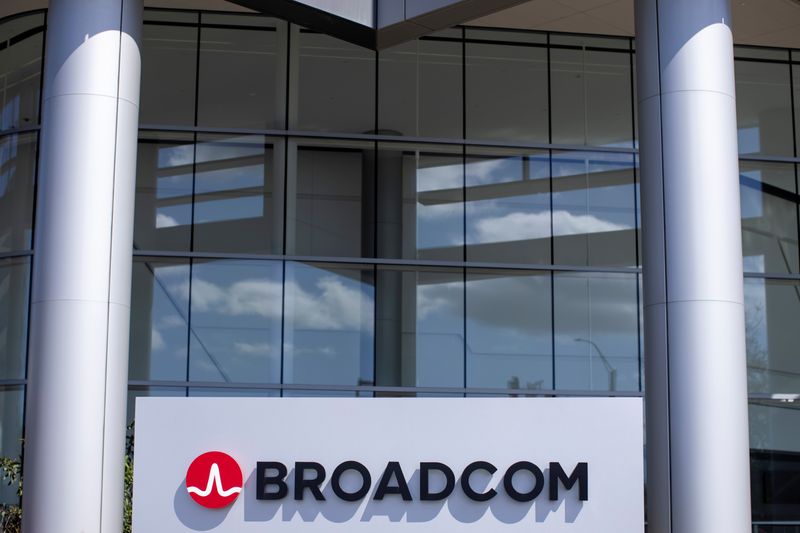By Arsheeya Bajwa and Siddarth S
(Reuters) - Broadcom (NASDAQ:AVGO) is predicting a massive expansion in demand for chips that power AI - and the market, for now, is buying it all the way.
The company's valuation hit $1 trillion on Friday as its shares surged 21% after CEO Hock Tan said AI could present a $60 billion to $90 billion revenue opportunity in 2027, more than four times the current size of the market. Broadcom also forecast first-quarter revenue above estimates on Thursday.
Several analysts said it was tough to estimate the market's growth and Broadcom's potential share, with TD Cowen noting the prediction is "difficult to prove/disprove, but is huge".
Big Tech's push to diversify beyond Nvidia (NASDAQ:NVDA)'s pricey and supply-constrained AI processors has been a windfall for Broadcom, which makes custom chips for major cloud companies.
Investors have also favored chipmakers that are already benefiting from the massive data centers being built by the likes of Microsoft (NASDAQ:MSFT) and Meta (NASDAQ:META) amid worries about the payoff from AI investments for the wider tech industry.
Broadcom CEO Tan said on Thursday the company has won two major hyperscaler customers, after it brought in $12.2 billion in AI revenue for fiscal 2024. That represented a major chunk of his estimated total serviceable market of $15 billion to $20 billion.
Of the total 2027 opportunity, Broadcom could capture as much as $50 billion in AI sales based on the 70% market share Broadcom estimated it had in 2024, TD Cowen analysts said. But they warned modeling the company's share was difficult because the serviceable market could include processors sold by the likes of Nvidia.
Rosenblatt Securities analyst Hans Mosesmann estimated a much lower market share for Broadcom in 2027 at between 20% and 50%.
Investors, meanwhile, scooped up the stock that trades at a lower multiple than rivals. Broadcom has a 12-month forward price-to-earnings ratio of 29.8, compared with 31.03 for Nvidia, the first chip firm to hit $1 trillion in market value, according to data compiled by LSEG.
"As AI shifts from training models to inference, more and more chip companies will gain an edge on Nvidia. Broadcom is the canary in the coalmine," said Thomas Hayes, chairman and managing member at Great Hill Capital.
Shares of Nvidia and rival AI chipmaker AMD (NASDAQ:AMD) fell about 3%, while Broadcom's smaller competitor Marvell (NASDAQ:MRVL) rose close to 9%. Contract chipmaker TSMC rose 4%.
Broadcom's shares are up more than 60% this year, while Nvidia's stock has more than doubled, as of last close. The gains eclipse those in major cloud companies, with Microsoft up about 11% this year and Alphabet (NASDAQ:GOOGL) - seen by analysts as Broadcom's biggest custom chip customer - rising 40%.

"They (Broadcom) went out of their way to give investors a reason to dream," Bernstein analyst Stacy Rasgon said.
"The AI story seems to really be coming into its own, perhaps Hock might think about shopping for a leather jacket," Rasgon said, referring to Nvidia CEO Jensen Huang's signature style.